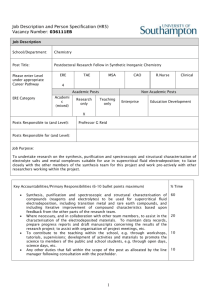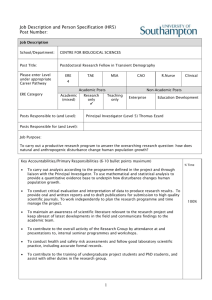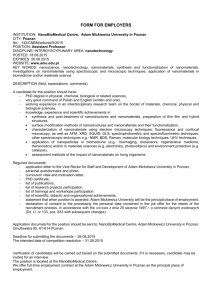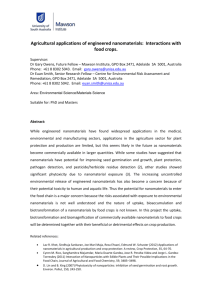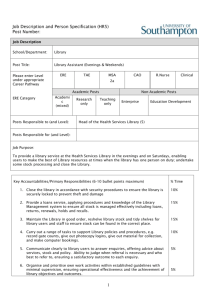Job Description and Person Specification
advertisement
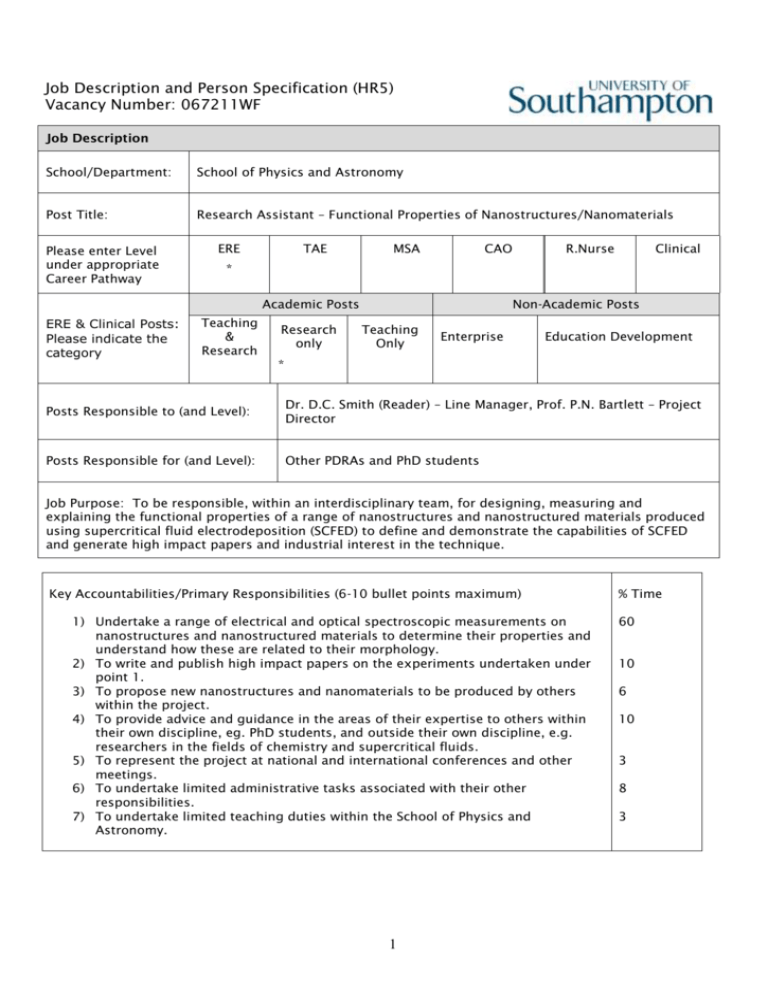
Job Description and Person Specification (HR5) Vacancy Number: 067211WF Job Description School/Department: School of Physics and Astronomy Post Title: Research Assistant – Functional Properties of Nanostructures/Nanomaterials Please enter Level under appropriate Career Pathway ERE TAE MSA CAO Clinical * Academic Posts ERE & Clinical Posts: Please indicate the category R.Nurse Teaching & Research Research only Non-Academic Posts Teaching Only Enterprise Education Development * Posts Responsible to (and Level): Dr. D.C. Smith (Reader) – Line Manager, Prof. P.N. Bartlett – Project Director Posts Responsible for (and Level): Other PDRAs and PhD students Job Purpose: To be responsible, within an interdisciplinary team, for designing, measuring and explaining the functional properties of a range of nanostructures and nanostructured materials produced using supercritical fluid electrodeposition (SCFED) to define and demonstrate the capabilities of SCFED and generate high impact papers and industrial interest in the technique. Key Accountabilities/Primary Responsibilities (6-10 bullet points maximum) 1) Undertake a range of electrical and optical spectroscopic measurements on nanostructures and nanostructured materials to determine their properties and understand how these are related to their morphology. 2) To write and publish high impact papers on the experiments undertaken under point 1. 3) To propose new nanostructures and nanomaterials to be produced by others within the project. 4) To provide advice and guidance in the areas of their expertise to others within their own discipline, eg. PhD students, and outside their own discipline, e.g. researchers in the fields of chemistry and supercritical fluids. 5) To represent the project at national and international conferences and other meetings. 6) To undertake limited administrative tasks associated with their other responsibilities. 7) To undertake limited teaching duties within the School of Physics and Astronomy. 1 % Time 60 10 6 10 3 8 3 Internal & External Relationships: (nature & purpose of relationships) Members of the Program Grant Team – the project is an interdisciplinary collaboration and will require considerable interaction with other researchers in a range of fields, including chemists, physicists and engineers. Teams will be formed as necessary to achieve specific objectives and the RA described here will be a part/lead these teams as the science and their skills dictate. These interactions will require a willingness to both listen to others in their areas of expertise and speak up when their expertise can contribute. Project Manager – to provide input into the planning and administration of the project and reports for external agencies such as the Advisory Panel and the funding body, EPSRC. Industrial and other end users of the research – to communicate the capabilities of supercritical fluid electrodeposition and seek input as to where it might most usefully be applied. Special Requirements: Person Specification Criteria Essential Desirable How to be assessed Qualifications, Knowledge and Experience: A first degree in physics, materials or related scientific or engineering discipline. * CV A PhD in physics, materials or related scientific or engineering discipline. * CV Experience of electrical transport measurements. * Experience of a range optical spectroscopy techniques including the use laser sources. * Experience of cleanroom techniques including ebeam and/or optical lithography and thin film deposition by evaporation and sputtering. * CV and Interview CV and Interview CV and Interview Planning and Organising: The ability to plan their own and others research and multi-task efficiently. * CV and Interview Problem Solving and Initiative: To be willing to act to stop unsafe behaviour. * To be willing to contribute their expertise to solving interdisciplinary problems. * 2 CV and Interview CV and Interview Management and Teamwork: To be an effective member of an interdisciplinary team. * To be willing to manage a small team of other researchers, including members of faculty, to achieve a short to medium term objective. CV and Interview * CV and Interview Communicating and Influencing: To be able to present their own and others research at conferences. * CV and Interview To be able to write good quality English and lead the drafting of journal papers. * CV and Interview To be able to communicate the benefits and capabilities of supercritical fluid electrodeposition to industry and other users. * To be willing to communicate to a general audience the importance and excitement of science. * Other Skills and Behaviours: Special Requirements: 3 CV and Interview CV and Interview Job Hazard Analysis Form - Appendix to Job and Person Specification Please tick one of the following statements: This post is an office-based job with routine office hazards e.g. use of VDU (if ticked, no further information needs to be supplied) This post has some hazards other than routine office e.g. more than use of VDU * Please tick all those that apply, and put N/A if not applicable Environmental Exposures O* Outside work Extremes of temperature (eg fridge/ furnace) * Potential for exposure to body fluids ## Noise (greater than 80 dba - 8 hrs twa) ## Exposure to hazardous substances (eg solvents, liquids, dust, fumes, biohazards). Specify …………………………………………………………. ## * Frequent hand washing Ionising radiation. Equipment/Tools/Machines used Food Handling ## Driving university vehicles(e.g. car/van/LGV/PCV) ## Use of latex gloves (note: prohibited unless specific clinical necessity) ## Vibrating tools ( e.g. strimmers, hammer drill, lawnmowers) ## Physical Abilities Load manual handling. Repetitive Crouching/Kneeling/Stooping Repetitive Pulling/Pushing Repetitive Lifting Standing for prolonged periods Repetitive Climbing i.e. steps, stools, ladders Fine motor grips (e.g. pipetting) Gross motor grips Repetitive reaching below shoulder height Repetitive reaching at shoulder height Repetitive reaching above shoulder height Psychosocial Issues Face to face contact with public * Lone working Shift work/night work/on call duties ## 4 F C O – Occasionally (up to 1/3 of time); F – Frequently (up to 2/3 of time); C – Constantly (more than 2/3 of time) ## denotes to HR the need for a full PEHQ to be sent to all applicants for this position. FOR SCHOOL/SERVICE USE ONLY ResourceLink Post Number Which post does this job report to Is this post a Line Manager? Yes No If yes, which posts directly report into it? ResourceLink Post Number Post 1 Post 2 Post 3 Post 4 Post 5 Post 6 Post 7 Post 8 Please add additional rows as required Background to Post We are looking to appoint an exceptional postdoctoral researcher to join our interdisciplinary team developing a disruptive deposition methodology, supercritical fluid electrodeposition, and studying the unique nanomaterials which it can produce. Supercritical fluids offer a unique combination of advantages for electrodeposition; large electrochemical windows allowing the deposition of highly reactive materials, e.g. Si, the ability to penetrate nanometer scale pores, high mass transport, high deposition temperatures and pressure tuneable properties. Our team were the first to develop a general method for electrodepositing from a supercritical fluid and we have demonstrated that supercritical fluids can be used to deposit into 3nm diameter pores to form continuous wires and optoelectronic quality II-IV semiconductors. This research has led to the award of a flagship Program Grant from the Engineering and Physical Sciences Research Council (EPSRC) of the United Kingdom which provides flexible funding [£5M] over five years to pursue this breakthrough in a number of different fields including electrodeposition of crystalline Si and the production of extreme nanomaterials with crystal structures which do not exist as bulk crystals. The research project is of considerable interest to a number of high tech industries and we will be appointing a technology transfer specialist to manage these interactions and maximise the impact of the research. We are looking for postdoctoral researchers who are experts in their own fields and excited by the prospect of working in an interdisciplinary environment. They will be expected to conduct their own program of research and contribute their expertise to other research projects. Due to the interdisciplinary nature of the research they will need good listening and communication skills. The form of the program grant offers particular advantages for postdoctoral researchers. These include the ability to propose research projects and take a leadership role, with associated control of their own budget, considerable funds for travel and staff development, and the fact that the success of the grant will be judged by EPSRC on their career prospects. There will be considerable opportunities for interested researchers to work closely with industry and possibly to be involved in exploiting the results of the research by transferring to existing companies or spin-outs. In addition we have nine PhD studentships for researchers to work on various aspects of the project including the physics of nanomaterials, synthesis of reagents and novel electrolyte salts, supercritical chemistry and electrochemistry, high resolution electron microscopy and nanotemplate fabrication. This project will provide an ideal training in both a specific subject related discipline, the broader field of nanomaterials and experience of working in a large interdisciplinary team. The successful candidate will be part of a large interdisciplinary team. This team is led by Prof. P. Bartlett, Budget Holder and Project leader, who is an internationally recognised electrochemist with 5 considerable management experience, including leading the School of Chemistry at the University of Southampton, and co-founder and director of Nanotecture, a spin-out which has generated ~£8m of venture capital funding and currently employs 5 people. The other investigators include Dr. D.C Smith (Deputy Project Leader), Prof. G. Reid, Prof. W. Levason, Dr. A.L. Hector at the University of Southampton, Prof M. George at the University of Nottingham, and Dr. J. Sloan at the University of Warwick. Post Description: The researcher who fills this post will be responsible for measuring and explaining the functional properties of a range of nanostructures and nanomaterials produced using supercritical fluid electrodeposition and in addition proposing new nanostructures and nanomaterials with exciting functional properties which might be produced using this novel technique. They will work as part of a material properties team consisting of 4 academics, 2 PDRAs, and 3 PhD students including specialists in atomic resolution TEM, micro and nanofabrication, and electrical and optical measurements on nanomaterials. The broad range of nanomaterials and nanostructures which SCFED can produce means that the key requirements for this post is a researcher with a good broad understanding of, and interest in, condensed matter physics in general and nanoscience in particular, a proven capacity to analyse and understand scientific problems, and a desire to learn new areas of science. We would not expect the successful applicant to have all the experimental skills we would like on arrival and have considerable experience in teaching those skills. However we would expect the successful applicant to have skills in some of the following areas; microfabrication including the lithographic patterning of contacts onto nanowires and devices from nanomaterials; optical spectroscopy as applied to solid state systems including familiarity with laser sources, e.g. femtosecond TiSa lasers, and techniques such as microscopy, e.g. dark field scattering measurements, Raman spectroscopy, and photoluminescence; low current electrical transport measurements; scanned probe microscopy, including AFM, MFM, KFM and other related techniques. This list is not exhaustive and we encourage applicants to present all their skills. The researcher who fills this post will also have to have good people and organisational skills. This will include the ability to communicate their expertise to scientists in other fields and good listening skills to enable the flow of information the other way. They will be expected to provide leadership to other researchers within the project, particularly PhD students, and this may include, if they are interested, leading sub-projects within the overall program with associated control over the budget. We are keen to work with ambitious people who wish to develop their careers. We are aware of the need for publications and other opportunities to enhance postdocs employability and have a history of providing an environment which leads to success in both industrial and academic research. We are keen to support people to apply for independent fellowships as we expect the field of SCFED to grow and are keen to increase the number of people working in this and related fields. Further Information The post is available to start immediately. The initial contract will be for two years with money available to extend the post to up to five years. Informal enquiries may be directed to Dr. David Smith (dcsmith@soton.ac.uk ) On-line applications via the University’s Recruitment web site – accompanied by a C.V. and names and addresses of two referees. 6
